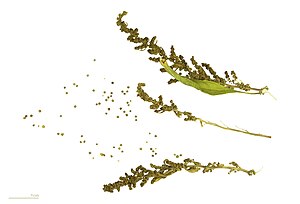Note: This is a project under development. The articles on this wiki are just being initiated and broadly incomplete. You can Help creating new pages.
Difference between revisions of "Dysphania ambrosioides - Epazote"
(→Photo Gallery) |
(→Photo Gallery) |
||
| Line 61: | Line 61: | ||
==Photo Gallery== | ==Photo Gallery== | ||
<gallery class="left" caption="" widths="140px" heights="140px"> | <gallery class="left" caption="" widths="140px" heights="140px"> | ||
| − | File: | + | File:Odermennig.jpg |
| − | File: | + | File:Agrimonia eupatoria02.jpg |
| − | + | Image:Agrimonia eupatoria MHNT.BOT.2004.0.jpg | |
| − | |||
</gallery> | </gallery> | ||
Revision as of 15:57, 16 May 2018
Epazote formerly Chenopodium ambrosioides, known as wormseed, Jesuit's tea, Mexican-tea, payqu (paico), Dysphania ambrosioides, or herba sancti Mariæ, is an annual or short-lived perennial herb native to Central America, South America, and southern Mexico.
Contents
- 1 Uses
- 2 Parts Used
- 3 Chemical Composition
- 4 Common names
- 5 Properties
- 6 Habit
- 7 Identification
- 8 List of Ayurvedic medicine in which the herb is used
- 9 Where to get the saplings
- 10 Mode of Propagation
- 11 How to plant/cultivate
- 12 Commonly seen growing in areas
- 13 Photo Gallery
- 14 References
- 15 External Links
Uses
helminthic infestation, indigestion, cramps, ulcers, asthma, intestinal worms, Folic, Diarrhea, Sore throats
Parts Used
Leaf, whole plant, seed.
Chemical Composition
Alpha-pinene, aritasone, ascaridole, butyric-acid, d-camphor, essential oils, ferulic-acid, geraniol[1]
Common names
| Language | Common name |
|---|---|
| Kannada | |
| Hindi | |
| Malayalam | |
| Tamil | |
| Telugu | |
| Marathi | NA |
| Gujarathi | NA |
| Punjabi | NA |
| Kashmiri | NA |
| Sanskrit | |
| English | Agrimony |
Properties
Reference: Dravya - Substance, Rasa - Taste, Guna - Qualities, Veerya - Potency, Vipaka - Post-digesion effect, Karma - Pharmacological activity, Prabhava - Therepeutics.
Dravya
Rasa
Guna
Veerya
Vipaka
Karma
Prabhava
Habit
Identification
Leaf
| Kind | Shape | Feature |
|---|---|---|
| Simple | oblong | The leaves are divided into 3-6 toothed leaflets, with smaller leaflets in between |
Flower
| Type | Size | Color and composition | Stamen | More information |
|---|---|---|---|---|
| Unisexual | 2-4cm long | Yellow | 5-10 | Flowers Season is June - August |
Fruit
| Type | Size | Mass | Appearance | Seeds | More information |
|---|---|---|---|---|---|
| simple | 7–10 mm (0.28–0.4 in.) long pome | clearly grooved lengthwise, Lowest hooked hairs aligned towards crown | With hooked hairs | {{{6}}} |
Other features
List of Ayurvedic medicine in which the herb is used
- Vishatinduka Taila as root juice extract
Where to get the saplings
Mode of Propagation
How to plant/cultivate
Epazote grows best in full sun in a warm tropical climate. Grows in cultivated garden beds.[2]
Commonly seen growing in areas
Tall grasslands, meadows, Borders of forests and fields.
Photo Gallery
References
External Links
- Ayurvedic Herbs known to be helpful to treat helminthic infestation
- Ayurvedic Herbs known to be helpful to treat indigestion
- Ayurvedic Herbs known to be helpful to treat cramps
- Ayurvedic Herbs known to be helpful to treat ulcers
- Ayurvedic Herbs known to be helpful to treat asthma
- Ayurvedic Herbs known to be helpful to treat intestinal worms
- Ayurvedic Herbs known to be helpful to treat Folic
- Ayurvedic Herbs known to be helpful to treat Diarrhea
- Ayurvedic Herbs known to be helpful to treat Sore throats
- Herbs with Leaf used in medicine
- Herbs with whole plant used in medicine
- Herbs with seed used in medicine
- Herbs with common name in English
- Habit - Herb
- Index of Plants which can be propagated by Seeds
- Index of Plants which can be propagated by Cuttings
- Herbs that are commonly seen in the region of Tall grasslands
- Herbs that are commonly seen in the region of meadows
- Herbs that are commonly seen in the region of Borders of forests and fields
- Herbs



